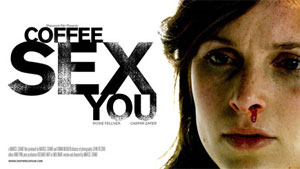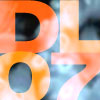 (JB) Time for my last post on this years Directors Lounge festival, which ended with a feature film, performances and a best-of screening on Sunday. To accordingly keep the mood down for a bit, I'll start with a rather not-so-good review of Marcel Grant's full feature film “Coffee Sex You”, about a young, attractive and upwardly mobile banker who decides to kill herself on her 27th birthday for reasons of unresolved childhood issues and an insufficiently medicated psychiatric disorder. Also, her married lover dumps her right in the beginning of the film, and we will see these three, obviously inter-related quandaries repeated throughout the narrative in flashbacks lest we forget that it's really tough. Grant and lead actress Rosie Fellner do a good job in depicting clinical depression as a state which is essentially dullness and self-injury, and not a certain wackiness and truly deep emotions as shown often in mainstream cinema, but things go decisively wrong with the introduction of virtually every of the film's other characters, which all look and act like straight out of a H&M advert. There is the thoughtful-but-charming main male lead (a screenwriter and the heroine's obvious love interest) in a corduroy jacket, blue jeans and colourful oversized scarves, and a tough-but-sexy indie film director, who – believe me – sported a fedora and neck-tie, because that's apparently what you wear when you're gender-concious female artist. While the “romantic comedy” aspect of the film prevails most of the time (apart from various hints to the 2005 London bombings, which I disliked even more, as, well, Terror is about real people dying and not the emotional predicaments of the young urbanite), the heroine – I'll spoil this one for you, this time – does indeed kill herself in the end; you might try to, by force, interpret a kind of unreliable narrator device into the film and thus legitimize the clichéd plot & characters as something she had constructed / seen through during her downward spiral. But maybe you don't have to, just watch “Last Life in the Universe” instead for a non-mainstream take on aimless & suicidal people in their late twenties.
(JB) Time for my last post on this years Directors Lounge festival, which ended with a feature film, performances and a best-of screening on Sunday. To accordingly keep the mood down for a bit, I'll start with a rather not-so-good review of Marcel Grant's full feature film “Coffee Sex You”, about a young, attractive and upwardly mobile banker who decides to kill herself on her 27th birthday for reasons of unresolved childhood issues and an insufficiently medicated psychiatric disorder. Also, her married lover dumps her right in the beginning of the film, and we will see these three, obviously inter-related quandaries repeated throughout the narrative in flashbacks lest we forget that it's really tough. Grant and lead actress Rosie Fellner do a good job in depicting clinical depression as a state which is essentially dullness and self-injury, and not a certain wackiness and truly deep emotions as shown often in mainstream cinema, but things go decisively wrong with the introduction of virtually every of the film's other characters, which all look and act like straight out of a H&M advert. There is the thoughtful-but-charming main male lead (a screenwriter and the heroine's obvious love interest) in a corduroy jacket, blue jeans and colourful oversized scarves, and a tough-but-sexy indie film director, who – believe me – sported a fedora and neck-tie, because that's apparently what you wear when you're gender-concious female artist. While the “romantic comedy” aspect of the film prevails most of the time (apart from various hints to the 2005 London bombings, which I disliked even more, as, well, Terror is about real people dying and not the emotional predicaments of the young urbanite), the heroine – I'll spoil this one for you, this time – does indeed kill herself in the end; you might try to, by force, interpret a kind of unreliable narrator device into the film and thus legitimize the clichéd plot & characters as something she had constructed / seen through during her downward spiral. But maybe you don't have to, just watch “Last Life in the Universe” instead for a non-mainstream take on aimless & suicidal people in their late twenties.
There was a similar disparity between form and substance in several of the films during Friday's Film and Poetry programme, for example in Kylie Hibbert's animated short “Mirror” (2005) after a poem by Sylvia Plath, which was illustrated with cut-outs straight from drawings & adverts from 50ies magazines and set to a gaily bouncing, funky tune; it did look fluid and charming indeed, but stood in an rather irritating contrast to Plath's haunting and desperate poem. Again, one might understand this as a subliminal critique of the gender main-streaming propagated through fashion and advertising, but as – according to the description on the zebra award's website – it's basically about “expand[ing] typographical conventions of published poetry“, Hibbert might not have been particularly interested in either the poem itself nor its author's era and biography.
Form & substance joined nicely in Joe Merrell's outstanding “Universal Now”, though, another piece from the Urban Research programme shown in the foyer. Merrell used the usually corny technique of 3D glasses to create a eerie, dreamlike promenade through a night-time city by layering slightly displaced footage and aligning the layers to different levels of depth; in the most mundane sequences, it was a genuine recreation of the simple effect you get by looking through multiple, reflecting glass panes at night, in others, the displaced lights and signals hovered in front of the screen like the apparition of an elusive urban deity. Like many pieces of good media art, you can describe the concept of “Universal Now” in one sentence, but have to experience it at first hand to actually understand how it works.>
 Another work I enjoyed was “Beatbox” (2007), a short film by Finnish artist Jani Ruscica, which sets the fine art of beatboxing in a let's say very spatialised urban context (I missed it during Tuesday's screening, but it was fortunately shown as one of the highlights in yesterday's compilation). The film itself is roughly divided in two parts, the first one starring Brooklyn slam poet Vocab, the second one showing a performance by several beatboxers, who recreate the sounds and rhythms of their home city in a both hyper-realistic and very theatrical, staged way; the second part being shot in the dark, using a flash-light or beacon to track the performers while they produce a live soundtrack you can easily mistake for the authentic noises of night-time animals and urban racket in the beginning. While difficult to pinpoint, it is obvious that this kind of performance has its political undertones, as has the high-speed flow of the spoken word artists; in a sense, they reclaim the rogue, irrational elements of the city's sound-scape to give it a new texture, and signature. I like this, and I hope you did as well, and also all the other fine films we had the opportunity to see during this year's Directors Lounge –
Another work I enjoyed was “Beatbox” (2007), a short film by Finnish artist Jani Ruscica, which sets the fine art of beatboxing in a let's say very spatialised urban context (I missed it during Tuesday's screening, but it was fortunately shown as one of the highlights in yesterday's compilation). The film itself is roughly divided in two parts, the first one starring Brooklyn slam poet Vocab, the second one showing a performance by several beatboxers, who recreate the sounds and rhythms of their home city in a both hyper-realistic and very theatrical, staged way; the second part being shot in the dark, using a flash-light or beacon to track the performers while they produce a live soundtrack you can easily mistake for the authentic noises of night-time animals and urban racket in the beginning. While difficult to pinpoint, it is obvious that this kind of performance has its political undertones, as has the high-speed flow of the spoken word artists; in a sense, they reclaim the rogue, irrational elements of the city's sound-scape to give it a new texture, and signature. I like this, and I hope you did as well, and also all the other fine films we had the opportunity to see during this year's Directors Lounge –
Thank you for reading,
Jacob



 Spree Getraenke
Spree Getraenke











0 Comments:
Post a Comment